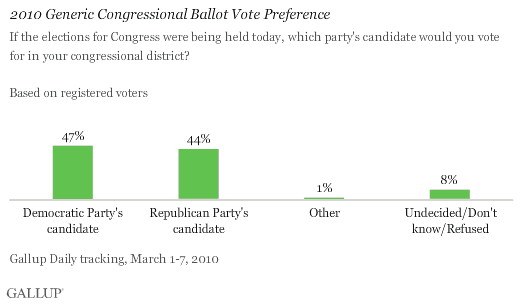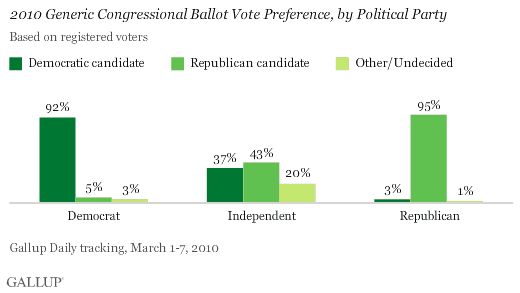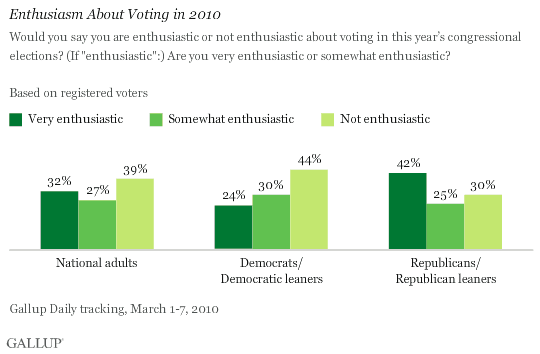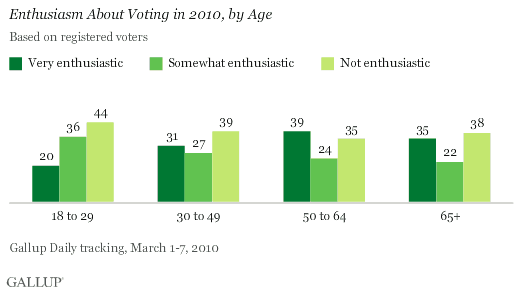PRINCETON, NJ -- Democrats lead Republicans by a slight 47% to 44% margin when registered voters are asked which party's congressional candidate they would support in their district "if the elections for Congress were being held today."At the same time, Gallup's inaugural weekly tracking update on the 2010 elections shows Republicans with a distinct advantage over Democrats in terms of enthusiasm about voting this year.

The relative closeness of the two parties on the "generic ballot" measure mirrors results found in separate stand-alone polls Gallup has conducted since October of last year.
These results are based on registered voters. Closer to the 2010 fall elections, Gallup will base its generic ballot results on voters deemed most likely to vote. Republicans generally are more likely to vote in midterm elections than are Democrats, usually giving the former an advantage among likely voters.
"Twenty percent of registered voters aged 18 to 29 say they are very enthusiastic about voting this November. That compares with 31% to 39% of older age groups who are very enthusiastic."
The current results, based on Gallup interviews with 1,585 registered voters conducted during the week of March 1-7, are the first installment of midterm election tracking updates, which Gallup will provide on a weekly basis between now and Election Day next November. Weekly results on the basic ballot and voting enthusiasm measures -- plus partisan differences on both of these -- will be released on Gallup.com each Tuesday.
Strong Partisan Differences
Both Republicans and Democrats show strong loyalty to their parties' candidates, with 92% of Democrats saying they will vote for the Democratic candidate in their district, and 95% of Republicans saying they will vote for the Republican candidate. Independents tilt toward the Republican candidate, although one out of six independents have no preference at this point. The tilt toward the Democratic candidate in the overall results is owing to Democrats' outnumbering Republicans nationwide among registered voters.

Enthusiasm About Voting
Gallup this week introduces a new measure of enthusiasm about voting, based on voters' responses when asked if they are enthusiastic or not enthusiastic "about voting in this year's congressional elections," with a follow-up among those who are enthusiastic that asks whether they are "very" enthusiastic or "somewhat" enthusiastic.
Approximately one-third of registered voters claim to be "very" enthusiastic about voting at this point, while almost 4 out of 10 are not enthusiastic.
There are significant differences in enthusiasm by party, with an 18-point "very enthusiastic" gap between Republicans and Republican-leaning independents on the one hand, and Democrats and Democratic-leaning independents on the other.

A similar enthusiasm gap was evident in a February Gallup update of a slightly different enthusiasm question. The February results showed that 55% of Republicans and Republican leaners were more enthusiastic than usual about voting, contrasted with 41% of Democrats and Democratic leaners.
One potential problem for Democrats is the lower enthusiasm about voting among young Americans. Twenty percent of registered voters aged 18 to 29 say they are very enthusiastic about voting this November. That compares with 31% to 39% of older age groups who are very enthusiastic.

Younger Americans are decidedly more Democratic than the national average. Thus, their apparent lack of motivation to vote -- if it continues until Election Day -- could deprive Democrats of the full benefit they could in theory derive if all 18- to 29-year-olds were to vote.
Gallup will update the enthusiasm about voting measure each week, providing a continuing measure of any shifts in the relative enthusiasm advantage the Republicans now enjoy as the election nears and campaigning intensifies.
Bottom Line
Gallup's inaugural weekly tracking update on Americans' voting intentions for this fall's important midterm congressional elections shows a narrow race, with Democrats holding a slight advantage among registered voters.
Because Republicans generally enjoy higher turnout than Democrats, the closeness of the race among registered voters could mean that Republicans would be at parity or holding a slight advantage if actual voting were to take place now.
Since 1950, when Gallup began using a "likely voter" model in congressional election estimates, the average Republican gain in moving from registered voters to likely voters in the final pre-election poll has been four points (because Democrats, on average, do not lose with the switch from registered voters to likely voters, the overall change in the Republican-Democratic gap has also averaged four points). Republican gains have ranged from no change to 11 points on the Republican share of the vote, and as much as an 11-point gain in the gap. In only one election have Democrats gained after applying the likely voter model.
The potential impact of turnout and motivation come November is underscored by the finding that Republicans hold a significant enthusiasm advantage over Democrats at this juncture.
Survey Methods
Results are based on telephone interviews with a random sample of 1,585 registered voters, aged 18 and older, conducted March 1-7, 2010, as part of Gallup Daily tracking. For results based on the total sample of national adults, one can say with 95% confidence that the maximum margin of sampling error is ±3 percentage points.
Interviews are conducted with respondents on landline telephones and cellular phones.
In addition to sampling error, question wording and practical difficulties in conducting surveys can introduce error or bias into the findings of public opinion polls.
